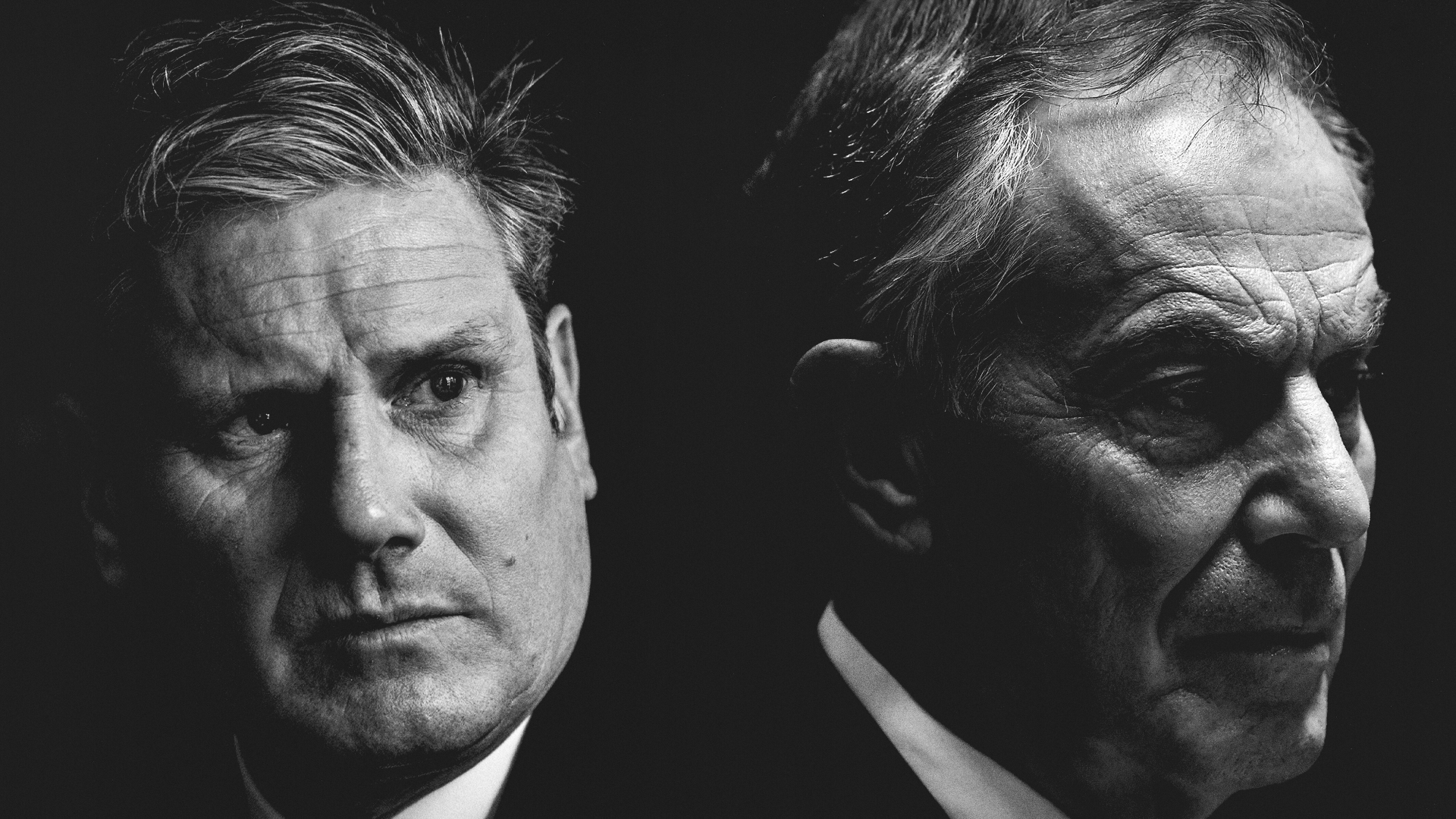The heir to Blair: does former Labour leader hold the answers for Keir Starmer?
Recent ‘cosy chat’ seen as political redemption for the former PM and political positioning for the man tipped to be the next one

A free daily email with the biggest news stories of the day – and the best features from TheWeek.com
You are now subscribed
Your newsletter sign-up was successful
Keir Starmer’s appearance at Tony Blair’s Future of Britain conference has been heralded by commentators as the political rehabilitation of Labour’s three-time election winner and an indication of the style of politics that may be on the way if Starmer wins the next general election.
The current and former Labour Party leaders joined one another on stage last month at the Park Plaza Westminster Bridge Hotel, just across the river from the Houses of Parliament, for what Politico called a “cosy chat”, which ended with the pair “congratulating each other on what a good job each had done”.
If Starmer is victorious, Blair “stands ready to be one of his successor’s most important sources of inspiration”, said Mario Ledwith and Patrick Maguire in The Times.
The Week
Escape your echo chamber. Get the facts behind the news, plus analysis from multiple perspectives.

Sign up for The Week's Free Newsletters
From our morning news briefing to a weekly Good News Newsletter, get the best of The Week delivered directly to your inbox.
From our morning news briefing to a weekly Good News Newsletter, get the best of The Week delivered directly to your inbox.
The pair “talk regularly in private” but Starmer’s outing with the New Labour pioneer “sent out the clearest signal yet to his unified version of the party that Blairism need no longer be seen as taboo”, they added.
What did the papers say?
Labour “can smell power now”, said The Sun’s Tony Parsons. “So it was fitting that Tony Blair chose to rise from his crypt and bestow his patronising blessing on Keir Starmer at a Future of Britain conference.”
That is because if Starmer does become prime minister, he will find that many of Britain’s problems “go all the way back to the catastrophic mistakes of Tony Blair’s 10-year reign”, Parsons added.
According to The Telegraph’s Tim Stanley, Starmer’s appearance was less about grappling with Blair’s legacy, more a clarification of Starmer’s own brand of politics.
A free daily email with the biggest news stories of the day – and the best features from TheWeek.com
“Had Jeremy Corbyn been invited to this conference, he’d have glued his hands to the floor in protest”, Stanley said. “But that’s the point. Corbyn was a socialist; Keir is desperate to prove he’s anything but.”
There may be good reasons for Starmer to try to imitate Blair, said Robert Shrimsley in the FT Magazine, given “pretty much everyone of consequence has either copied his style or defined themselves against it. And most of those who defined themselves against him are unified by not having been prime minister.”
Even after all these years, Blair “remains the reference point for how a prime minister looks”, Shrimsley said. But if Starmer does pursue a policy of emulation, he is going to face an uphill battle given he “lacks Blair’s charisma, clarity, zeal and certainty”. And even more significantly, “he fails to engender the excitement that Blair created before coming to power”, Shrimsley concluded.
What next?
Starmer’s agenda as Labour leader now “so closely resembles the policy prescriptions put forward by the Tony Blair Institute”, argued Tom McTague, political editor of UnHerd, “that there is talk throughout Westminster of a Blairite reconquista”.
The Labour leader “doesn’t have very many ideas or contacts, and Blair stands ready to oblige”, Fraser Nelson in The Telegraph agreed. Consequently, “we can expect to see a good number of these Blairite staffers and allies transferred into a Starmer government. Some have started work already”.
Yet the connection between the two men may only go so far, said Andrew Marr in the New Statesman. Starmer is certainly an admirer of Blair, but he is also cautious of getting too close to his predecessor.
The current Labour leader “regards Blair’s experience, not least as a Labour prime-minister-in-waiting, as immensely valuable”. However, Marr added, “there is little sense of the sorcerer and his apprentice; rather a wary mutual respect”.
Some also question the extent to which Blair or his staff really wield decisive influence. “Some people understand better than others that what it means to be a Labour moderniser in 2023 isn’t quite the same as 1997,” one told The Times’s Ledwith and Maguire.
Indeed, Starmer is “a different breed of Labour leader” from many we have seen in recent years, said John Crace in The Guardian. He is “a man with an eye on the Downing Street prize. A pragmatist who will do whatever it takes to win an election.”
For better or worse he is also a man who “recognises politics is a grubby game”, Crace added. One who feels implicitly that “there’s nothing to be gained by being on the right side of the argument if you’re left twiddling your thumbs on the opposition benches”.
At the end of their conversation at the Future of Britain conference, Blair turned to Starmer and said “we’ll be in good hands with you.” For Crace, with those few words, “a healing of sorts had taken place”.
Arion McNicoll is a freelance writer at The Week Digital and was previously the UK website’s editor. He has also held senior editorial roles at CNN, The Times and The Sunday Times. Along with his writing work, he co-hosts “Today in History with The Retrospectors”, Rethink Audio’s flagship daily podcast, and is a regular panellist (and occasional stand-in host) on “The Week Unwrapped”. He is also a judge for The Publisher Podcast Awards.